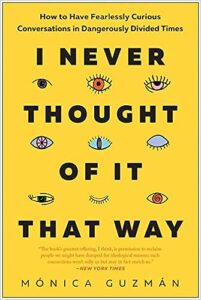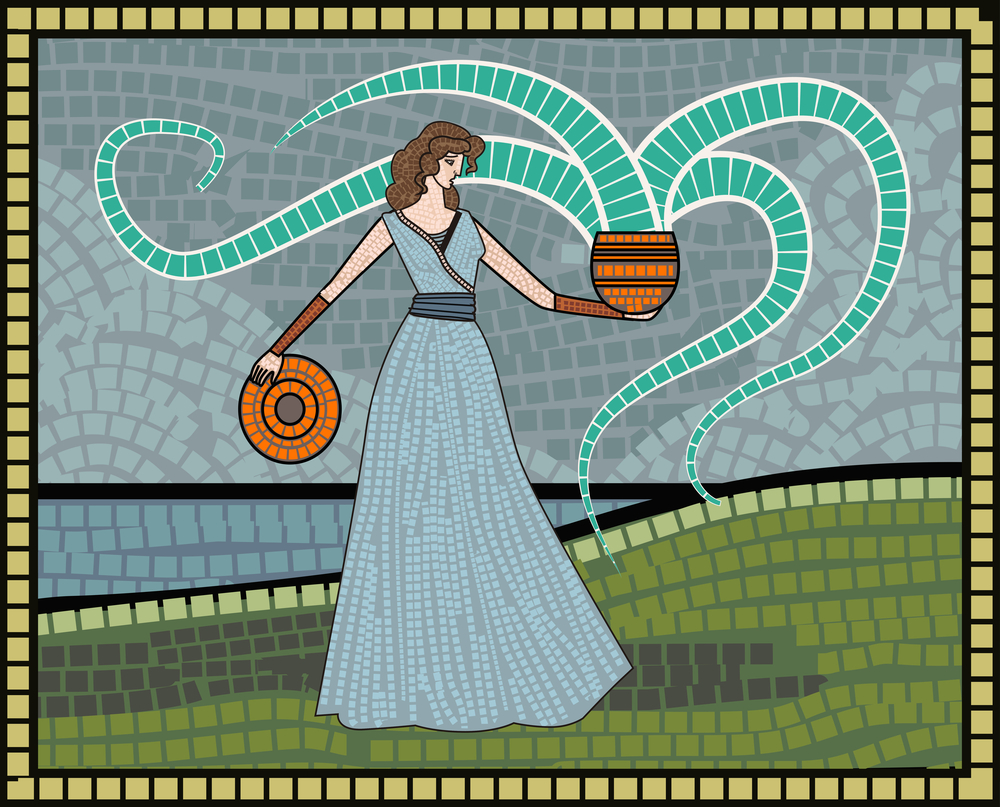Maybe More Isn't Better
By Kevin Lavery
The internet and social media have allowed humanity to progress economically, socially, and scientifically. Information and communication are far easier to access with the internet, which has led to an improvement in education in developing nations, the overthrow of dictatorial regimes during the Arab Spring, and allowed public health institutions to disseminate accurate, life-saving information during the COVID-19 pandemic. But it’s also true that more information doesn’t mean better understanding of information or more optimal communication. Misinformation and political polarization are running rampant in today’s America about contentious issues from the 2020 election to the efficacy of the COVID vaccine. It’s difficult to see how we can put Pandora back in the box, and begin having productive conversations and forging deep connections in the age of social media.

Monica Guzman joins EconTalk host Russ Roberts to discuss the importance of honesty, curiosity, and respect, the harm of having agendas in conversations, and how empathy can lead to depolarization and a better understanding of truth. Guzman is a journalist, senior fellow for public practice at Braver Angels, and author of I Never Thought of it That Way.
Guzman refers to social media as the “boss level of communication,” as productive conversations are extremely difficult on social media. Interactions tend to be short, reactionary, and out of the proper context. Add to this the lack of face-to-face communication and a constantly pessimistic news cycle, and social media platforms have become cesspools of political polarization. Guzman calls this the adolescence of communication. We have all the tools to have wonderful communication, but creating the tools is the easy part; engaging with them healthily at a societal level, is the true challenge. And according to Guzman, we’re currently failing:
This leads to the politics of misinterpretation. It’s becoming increasingly difficult to tell what people mean, and therefore easier to assume that someone we disagree with is wrong or evil. Arguments are becoming weaponized through misinterpretation”
This game of mutual misinterpretive dodgeball is a large problem to Guzman because it creates a lack of trust in each other, and consequently causes a fear of engagement. If you feel the other side isn’t truly listening to you and will use anything they can get to hurt you and destroy your values, why would you engage in conversation or debate in the first place? Guzman asserts that this lack of trust dangerously undermines democracy. If you and I can’t trust each other to participate in a conversation fairly, then how could we trust each other to run a nation, or not to steal elections?
I think one of the challenges of democracy in the United States right now is the lack of trust that the “other side” will play fairly. Therefore, when you’re in power, you have to do everything you can to get your side as far ahead so that when they come in, they won’t catch up. That could turn out very dark, indeed.
In her book, Guzman describes how we’ve begun to view each other as puzzles instead of mysteries:
Viewing people as puzzles is problematic because it leads to assumptions about others’ perspectives, instead of genuinely seeking to find out what one believes. Instead of getting to the root of why people reach certain conclusions, conversation becomes a game of posturing and accusation. If you already know the answers, why would you bother showing your work?
Productive conversations require challenges, and it’s easy to avoid these challenges.. When we do this we fail democracy, and we fail each other. We create more faulty information about the other side, and therefore create a paradox of polarization. Guzman states that “one of the most pernicious things we believe is that people who oppose what we support must hate what we love.” When this is the assumption coming into a conversation, the ability to connect and change minds is already lost. Says Guzman:
You are already condescending–when you look at that sign, you are approaching it with condescension and you can’t be curious. And, that kind of shuts down everything before it starts.
I find it interesting: we care a lot about facts and truth, but that doesn’t seem to apply to the truth about people’s perspectives. That’s where it seems we don’t obsess about truth. But, I just think that’s really killing us because when people feel understood, that’s when you can build trust. And without sufficient trust, we can’t collectively search for truth.
Guzman and Roberts explore how agendas in conversations are problematic. In political conversations this goal is often to be correct, to affirm how your ideas are superior. With agendas, victory is valued over making a connection with another human being. Roberts adds to this, saying this is a pernicious way to dehumanize and objectify other people, as we’re not valuing what they have to say or truly listening to the personal experiences that have shaped the way they see the world, but instead we’re focused on the ways we can respond. He says,
I think a lot of our discussions online, especially around politics, are about the ideas. When we focus on the ideas that’s the center of gravity, instead of focusing on each other and our journey through this world and how we interpret world events and how they mix in with our values and experiences and who we become as people and our ideas about how we should all thrive together. That’s a fascinating thing.
Instead, I go behind the conversation about truth to the conversation about what’s meaningful. Who are they? What led them to these beliefs? What are the concerns and hopes and fears that animate, right? And then, what can I present about how I see those things and how can our perspectives sort of intermingle? And build trust, and build the kind of connection where maybe someday something could cross that makes them see something in a different light, or makes me see something in a different way.
Guzman argues that conversations need to embody more honesty, empathy, and respect. After all, conversations are how we solve problems, and without honestly portraying your perspective, respecting the other party’s perspective, and empathetic understanding how they came to a different conclusion, agreements simply cannot be reached, and it becomes impossible to challenge your own beliefs, humanize the other party, and solve problems with anyone you disagree with.
Nico Perrino and Juliette Sellgren discuss a similar theme on an episode of The Great Antidote Podcast. What tends to be forgotten is without conversation as a medium to come to agreements, violence becomes much more attractive to solve disputes, therefore if political violence is to be prevented, honest, empathetic, and respectful conversations are a necessity. Much of what Guzman and Roberts discuss in relation to conversation isn’t talking itself; much of empathy and respect comes from listening. Guzman also adds that listening can also be a very effective tool to de-radicalize people, as when people feel heard, they’re more receptive to other ideas.
…I talk about listening–it’s more than paying attention, being present, making sure you’re not just waiting for your turn to speak. Listening is showing people they matter. That’s what it is. That’s the criteria we each have: Have I been heard? Do I feel like I mattered in that? Do I feel demeaned, neglected, ignored, shoved aside in one way, undervalued?
Looking at bad ideas generously is more about looking at the people who hold them generously. Which, by the way, makes them more intellectually humble. There’s been research on this, too, that I’m so into right now: where, if someone just brings to mind a person in their life who tends to receive their ideas generously–not agree with them, but just listen, show them they matter–that person will become more intellectually humble. Meaning, they’ll be more likely to let some breathing room appear around their ideas so they could consider others.
This gets into curiosity, the object of Guzman’s book. To Guzman and Roberts, curiosity and empathy go hand in hand. This is quite easy to imagine; when someone is genuinely curious about how you feel or what you’re thinking about a certain issue, it shows that your thoughts, feelings, and perspectives matter to them. However, Guzman doesn’t limit the effect of curiosity squarely to interpersonal relationships, she expands this principle to democracy at large.
A feature of conversations that Guzman values is clarification over reaction, so much that it’s a staple in the events of Braver Angels.
As Guzman states, clarification isn’t limited to what someone believes, but it also extends to why someone believes what they do. This is crucial because we tend to forget that people who believe in reprehensible things don’t have the same experiences we do. Neo-Nazis, neo-confederates, white supremacists, etc. are often victims of propaganda and general societal ills. The socio-political environment is at fault for creating racists, homophobes, and anti-Semites. It’s comforting to think that if one was raised in the antebellum south that we would be a part of the underground railroad, would’ve fought for the union, and battled against slavery. This doesn’t mean slavery, racism, and secession are moral or defensible, but it does mean that we should seek to understand why people laid down their lives for evil. E
After all, as Guzman states, “The end goal is persuasion. The end goal absolutely is persuasion. We need a society where we can mix our ideas generously and the best ideas actually win.” Humanization and empathy clearly have an end goal, that being education, and the emergence of knowledge. Roberts likens this to his experience as President of Shalem College, as when great works of literature are discussed in classes, the professor isn’t teaching the students what meaning is to be derived from the text, it’s discovered in conversation and reflection in discussion. We need to trust each other a little more to find the truth within conversations.
I had a few questions and points to add while listening to this episode. We hope you’ll take the time to share your thoughts as well.
1- What does a resistance to debate mean for the future of free speech and democracy? Could a social enforcement of certain topics being off limits for discussion lead to spaces for anti-democratic or morally reprehensible ideas to grow or would it stifle them?
2- Towards the end of the podcast Guzman states that “you don’t have to talk to a Nazi tomorrow,” to highlight the importance of small steps in challenging your beliefs. However, a problem occurs when the Nazi’s don’t want to have a discussion. How can people who don’t want to engage with those outside of their ingroups be engaged in conversation, and eventually persuaded to change their beliefs?
3- Guzman and Roberts discussed methods of curious and empathic conversation at length. So, how can a conversation that goes off the rails be reset to a healthy and productive engagement?
[Editor’s Note: This Extra was originally published on August 6, 2023.]
Kevin Lavery is a student at Western Carolina University studying economic analysis and political science and a 2023 Summer Scholar at Liberty Fund.

